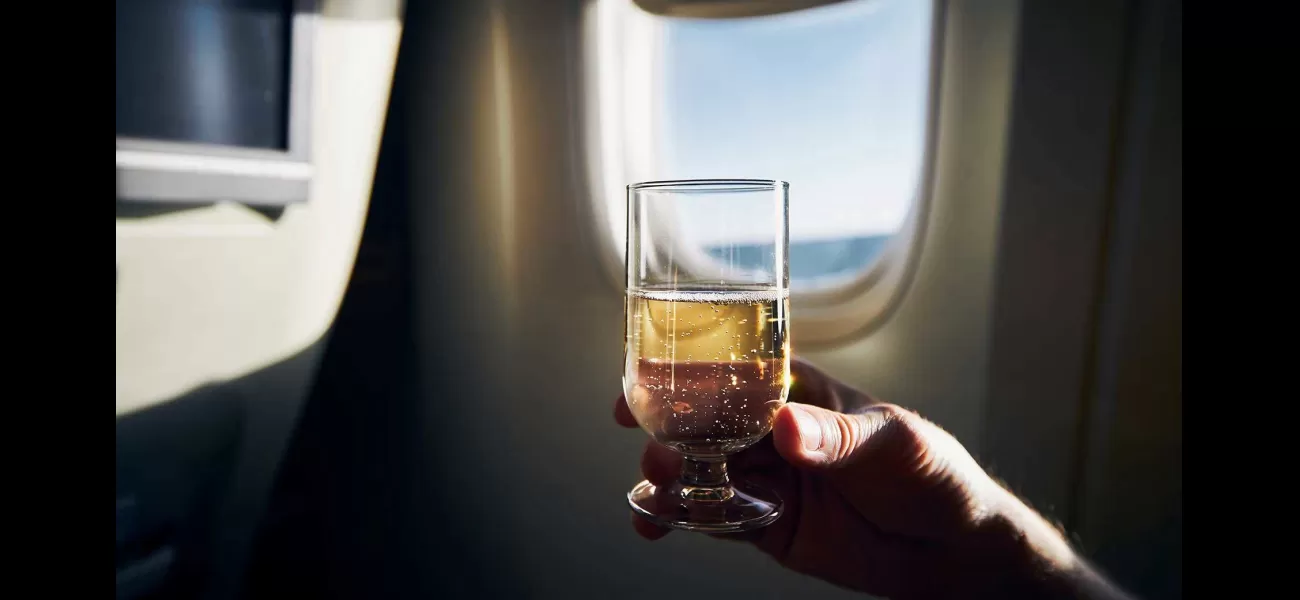Don't consume alcohol before sleeping on a flight as it can have negative effects on your current and future well-being.
A recent study discovered that mixing alcohol with the low pressure and oxygen on a plane can have negative effects on the heart.
June 4th 2024.

As the "fasten seat belt" sign switches off, it's the perfect time to catch some shut-eye on your flight. You reach for your trusty neck pillow, eye mask, and a glass of wine to ensure a restful journey. However, according to new research, this may not be the best idea.
Aeroplane cabins are pressurized to mimic an elevation of 2438 meters, resulting in lower air pressure and oxygen levels compared to what we experience on the ground. Combined with alcohol consumption and sleep, this can lead to a significant drop in oxygen saturation in the blood, as shown in a recent study published in the journal Thorax.
Dr Eva-Maria Elmenhorst, the lead author of the study and deputy of the department of sleep and human factors at the DLR Institute of Aerospace Medicine in Cologne, Germany, advises against drinking alcohol on flights. To investigate this further, researchers simulated an aeroplane cabin environment and had 48 healthy adults sleep for four hours in two different scenarios - one without alcohol and one after consuming the equivalent of two glasses of wine or cans of beer.
The results showed a decrease in oxygen levels and an increase in heart rate on the nights when alcohol was consumed. The researchers also noted that this combination of alcohol and sleep can place a strain on the heart and potentially worsen symptoms in individuals with cardiac or pulmonary diseases. Although the study is small, it serves as a starting point for further investigation into the relationship between sleep, flight, and alcohol.
Cardiologist Dr Andrew Freeman, director of cardiovascular prevention and wellness at National Jewish Health in Denver, who was not involved in the research, emphasizes the negative impact of drinking on both long-term health and the immediate goal of getting some rest. Many people turn to alcohol to help them sleep on flights, but this can have adverse effects on their health.
The study not only looked at heart strain but also delved into the quality of sleep among participants. It was found that those who had consumed alcohol experienced shorter periods of REM sleep, which is essential for memory consolidation and brain recovery. This aligns with the observations of Dr Freeman, who explains that although alcohol may help one fall asleep faster, the quality of sleep is not as good compared to being sober.
Dr Shalini Paruthi, an adjunct professor at Saint Louis University School of Medicine and American Academy of Sleep Medicine spokesperson, who was not involved in the research, explains that alcohol can lead to fragmented sleep, with individuals waking up more frequently throughout the night and not sleeping for long periods. She also cautions against the use of sleep aids with alcohol, as both are depressants and can intensify their sedative effects when combined.
To ensure a well-rested journey, Dr Freeman suggests sticking to your natural body cycles when planning flights. This can involve selecting a flight that aligns with your sleep patterns, so you can either finish sleeping or start your day upon arrival. It's also essential to avoid consuming too many stimulants, such as coffee or energy drinks, or depressants like alcohol.
Staying hydrated is also crucial, as flying can lead to dehydration. Dr Freeman recommends drinking plenty of water and opting for lighter, plant-based food options at the airport and on the plane. Exercise can also aid in better sleep, so he suggests taking the stairs and walking instead of using elevators and moving sidewalks. If on a long flight, it's advisable to get up and move around periodically.
Lastly, Dr Freeman reminds us to limit screen time and exposure to blue light, which can disrupt our sleep patterns. Investing in noise-cancelling headphones and avoiding screens, especially during take-off, can help promote better sleep on flights. While it may be challenging to maintain healthy habits while flying, making an effort to do so can leave you feeling refreshed and ready for your adventures upon arrival.
Aeroplane cabins are pressurized to mimic an elevation of 2438 meters, resulting in lower air pressure and oxygen levels compared to what we experience on the ground. Combined with alcohol consumption and sleep, this can lead to a significant drop in oxygen saturation in the blood, as shown in a recent study published in the journal Thorax.
Dr Eva-Maria Elmenhorst, the lead author of the study and deputy of the department of sleep and human factors at the DLR Institute of Aerospace Medicine in Cologne, Germany, advises against drinking alcohol on flights. To investigate this further, researchers simulated an aeroplane cabin environment and had 48 healthy adults sleep for four hours in two different scenarios - one without alcohol and one after consuming the equivalent of two glasses of wine or cans of beer.
The results showed a decrease in oxygen levels and an increase in heart rate on the nights when alcohol was consumed. The researchers also noted that this combination of alcohol and sleep can place a strain on the heart and potentially worsen symptoms in individuals with cardiac or pulmonary diseases. Although the study is small, it serves as a starting point for further investigation into the relationship between sleep, flight, and alcohol.
Cardiologist Dr Andrew Freeman, director of cardiovascular prevention and wellness at National Jewish Health in Denver, who was not involved in the research, emphasizes the negative impact of drinking on both long-term health and the immediate goal of getting some rest. Many people turn to alcohol to help them sleep on flights, but this can have adverse effects on their health.
The study not only looked at heart strain but also delved into the quality of sleep among participants. It was found that those who had consumed alcohol experienced shorter periods of REM sleep, which is essential for memory consolidation and brain recovery. This aligns with the observations of Dr Freeman, who explains that although alcohol may help one fall asleep faster, the quality of sleep is not as good compared to being sober.
Dr Shalini Paruthi, an adjunct professor at Saint Louis University School of Medicine and American Academy of Sleep Medicine spokesperson, who was not involved in the research, explains that alcohol can lead to fragmented sleep, with individuals waking up more frequently throughout the night and not sleeping for long periods. She also cautions against the use of sleep aids with alcohol, as both are depressants and can intensify their sedative effects when combined.
To ensure a well-rested journey, Dr Freeman suggests sticking to your natural body cycles when planning flights. This can involve selecting a flight that aligns with your sleep patterns, so you can either finish sleeping or start your day upon arrival. It's also essential to avoid consuming too many stimulants, such as coffee or energy drinks, or depressants like alcohol.
Staying hydrated is also crucial, as flying can lead to dehydration. Dr Freeman recommends drinking plenty of water and opting for lighter, plant-based food options at the airport and on the plane. Exercise can also aid in better sleep, so he suggests taking the stairs and walking instead of using elevators and moving sidewalks. If on a long flight, it's advisable to get up and move around periodically.
Lastly, Dr Freeman reminds us to limit screen time and exposure to blue light, which can disrupt our sleep patterns. Investing in noise-cancelling headphones and avoiding screens, especially during take-off, can help promote better sleep on flights. While it may be challenging to maintain healthy habits while flying, making an effort to do so can leave you feeling refreshed and ready for your adventures upon arrival.
[This article has been trending online recently and has been generated with AI. Your feed is customized.]
[Generative AI is experimental.]
0
0
Submit Comment





